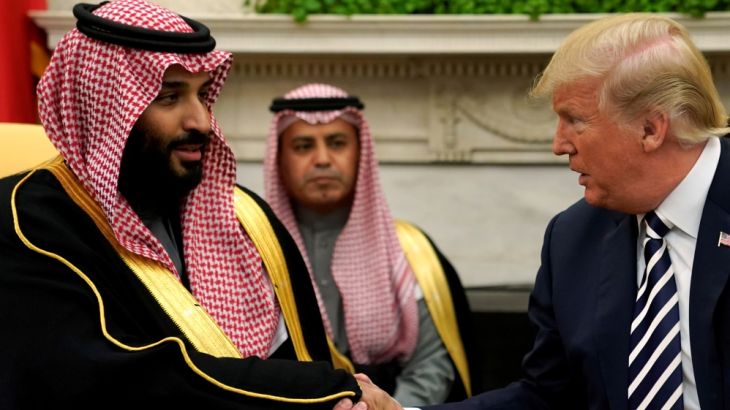US approves secret nuclear power work for Saudi Arabia
The US administration has reportedly authorized US companies to sell nuclear power technology to Saudi Arabia.

US Energy Secretary Rick Perry has approved six secret authorisations for companies to sell nuclear power technology and assistance to Saudi Arabia, according to a copy of a document seen by the Reuters news agency.
The Trump administration has quietly pursued a wider deal on sharing US nuclear power technology with Saudi Arabia, which aims to build at least two nuclear power plants.
Keep reading
list of 4 itemsSaudi Arabia’s Riyadh selected to host World Expo in 2030
Qatar’s emir receives Saudi Arabia’s foreign minister on an official visit
Saudi Arabia’s e-sports looking to nurture its own hit games
Perry’s approvals, known as Part 810 authorisations, allow companies to do preliminary work on nuclear power in advance of any deal but not ship equipment that would go into a plant, a source with knowledge of the agreements told Reuters news agency on condition of anonymity.
The approvals were first reported by the Daily Beast.
The Department of Energy’s National Nuclear Security Administration (NNSA) said in the document that the companies had requested that the Trump administration keep the approvals secret.
“In this case, each of the companies which received a specific authorization for (Saudi Arabia) have provided us written request that their authorization be withheld from public release,” the NNSA said in the document.
In the past, the Energy Department made previous Part 810 authorisations available to the public at its headquarters.
Nuclear arms race
A Department of Energy official said the requests contained proprietary information and that the authorisations went through a multi-agency approval process.
Many US legislators are concerned that sharing nuclear technology with Saudi Arabia could eventually lead to a nuclear arms race in the Middle East.
Saudi Crown Prince Mohammed bin Salman told US broadcaster CBS last year that the kingdom would develop nuclear weapons if its rival Iran did.
“There is a big difference between the Iran nuclear deal and the Trump administration’s attempts to sell nuclear technology to Saudi Arabians,” Will Saetren, a nuclear security specialist, told Al Jazeera.
“The nuclear technology that we want to sell to Saudi Arabia is civilian, it’s for their civilian energy programme, which is a big difference in what we suspected that Iran was trying to do.
“Ironically the equipment they were using for the pursuit for their nuclear weapons programme had originated from the US. We sold it to the shah of Iran back in the 70s, the regime is now quite different, the story is quite different. However, the Joint Comprehensive Plan of Action (JCPOA) effectively cut their pathway off to ever developing a nuclear weapon and Iran willingly did this.
“So the concern now is that Saudia Arabia might go down the same path – that they might use this technology that they would be acquiring for their civilian nuclear energy programme for development of a weapons programme down the line,” Saetren said.
In addition, the kingdom has occasionally pushed back against agreeing to US standards that would block two paths to potentially making fissile material for nuclear weapons clandestinely: enriching uranium and reprocessing spent fuel.
Concern in Congress about sharing nuclear technology and knowledge with Saudi Arabia rose after US-based journalist Jamal Khashoggi was killed last October in the Saudi consulate in Istanbul.
The Part 810 authorizations were made after November 2017, but it was not clear from the document whether any of them were made after Khashoggi’s killing.
Representative Brad Sherman, a Democrat, called on Secretary of State Mike Pompeo during a congressional hearing on Wednesday to release the names of the companies that got the approvals by the middle of April, and Pompeo said he would look into it.
Ignored warnings
Sherman also said the Trump administration had attempted to evade Congress on sharing nuclear power with the kingdom.
Pompeo said the administration was working to ensure any shared nuclear power technology would not present proliferation risks.
Last month, Democratic House members alleged in a report that top White House aides ignored warnings they could be breaking the law as they worked with former US officials in a group called IP3 International to advance a multibillion-dollar plan to build nuclear reactors in the Middle East, including Saudi Arabia.
IP3 did not immediately respond to a request for comment about whether it was one of the companies that got a Part 810 authorization.
Separately, the Government Accountability Office (GAO), the investigative arm of Congress, accepted a request by Senators Marco Rubio, a Republican, and Bob Menendez, a Democrat, to probe the administration’s talks on a nuclear deal with Saudi Arabia, the GAO said on Wednesday